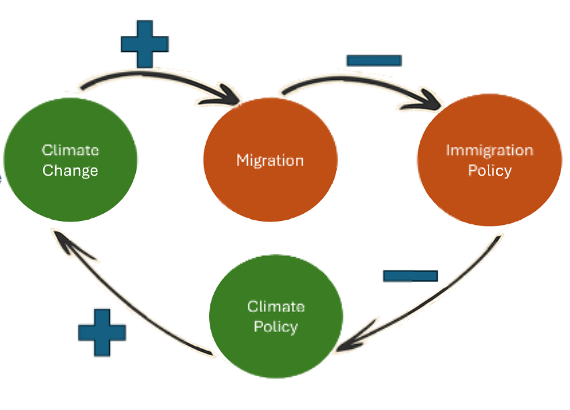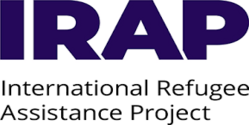

Framing Climate Migration: Disrupting the Negative Feedback Between Climate and Migration Politics
Project Overview
History has been marked by the constant movement of people in response to changing climates, natural disasters, and environmental degradation. These movements have usually resulted in shaping new societies, expanding territories, and driving economic growth. These movements have been a way to adapt to changing environments and embrace new opportunities for the development and survival of humanity. The reality of climate change today is of a different magnitude and consequence, occurring in a politically, economically, and socially labyrinthine world. The International Organization for Migration estimates that environmental and climate change could displace from 25 million to 1 billion people by 2050, either within their countries or across borders.
That very same migration could lead to domestic andinternational political challenges that destabilize normal governance and fuel conflict. Moreover, anti-immigration policies have become a core element of many far-right politicians, as has climate change denialism, a factor polarizing electorates around the world. The political intersection of climate change policy and migration thus constitutes a powerful negative feedback loop, with climate change driving more migration and internal displacement, increasing polarization, and weakening environmental cooperation and policymaking.
Our project is dedicated to breaking this cycle by developing a body of research and fostering a collaborative community of scholars, organizations, and policymakers to tackle climate migration proactively. Through strategic partnerships and case studies, we explore:
-
How different types of migration are attributed to climate change
-
The adequacy of existing global frameworks, local policies, and international assistance in addressing these challenges
-
Innovative approaches to climate migration, aiming to drive policy and financial support, bolster the resilience of migrant-receiving communities, and strengthen the international response.
-
Strategies to address and mitigate the rising political backlash against climate migrants by countering misinformation, fostering public awareness, and advocating for inclusive policies recognizing climate migration as a legitimate global challenge.
We take a multidimensional approach to tackling climate migration challenges:
Pioneering Research: Produce case studies investigating climate migration’s root causes, governance gaps, and policy shortcomings while evaluating international response frameworks and developing solutions to counteract negative political narratives and foster global cooperation.
Educating Future Leaders: Our Yale University course, “Framing” Climate Migration: Science, Policy, Ethics, and Politics of a Growing Crisis, offers intensive seminars for students from diverse disciplines, offering an option for summer fieldwork. It examines attribution science, migrant experiences, host community responses, and the rise of negative narratives while addressing legal, human rights, and policy challenges to shape more effective and inclusive solutions.
Building Actionable Frameworks: Partnering with local and international organizations to develop real-world strategies rooted in the lived experiences of climate migrants while advocating for safe, dignified, and systematic movement of people.
Our Vision
We envision a world where climate migration is recognized, addressed positively, proactively, and integrated into solutions for the broader climate crisis. Our mission is to:
- Advocate for the policy and legal recognition of climate migrants.
- Shift public perception by amplifying migrant voices, challenging far-right narratives, and facilitating mobility or resilience to enable both relocation and the ability to stay in place.
- Collaborate with organizations with aligned values to uphold the rights and well-being of climate migrants or internally displaced people and ensure just and dignified treatment.
- Promote evidence-based, inclusive decision-making at both national and global levels. We aim to reduce the need for migration due to climate change by fostering collaboration across research, policy, and aid frameworks to address climate migration in a way that makes the world more resilient, equitable, and sustainable for all.
Collaborators
How You Can Get Involved
We are looking for partners, funders, and collaborators to help advance our mission. Ultimately, our mission is to contribute to a future where climate migration is part of the solution to the broader climate crisis. Together, we can reframe it from a crisis to a catalyst for change and economic growth.
Contact: yaleycej@gmail.com









